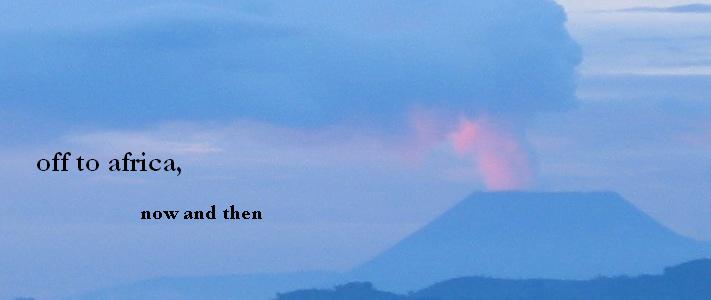I heard an African filmmaker talk about a movie she made, and she said, "One thing about me is that I'm not afraid to be broke. A lot of people are really afraid of being broke, but I'm not. I could do what other filmmakers do. They apply for grants, mostly from France, but it can take three years to get the money that way, and I'm impatient."
I love this.
I especially love it right now, because I need it.
...
I'm not glad to be far away from my family - that pang still comes. But this place. I can't describe what it means to me.
I'm so glad to be here.
I walk the tree-lined streets of my neighborhood, and I'm so glad to be here.
I stand on the bustling streets downtown, and I'm so glad to be here.
I go see an African movie, and I'm so glad to be here.
When I think about it, this is the first place in this country where I've felt like I belong. I was 10-and-a-half when we left Liberia and moved to the Mitten, and I tell people sometimes that it was like Mean Girls, the movie, except that I never became the top Mean Girl.
We moved to a place where everyone was the same, particularly in our religious community, and the penalty for being different was high. The place I came from didn't matter: no one cared about the tiny articles I found and cut out and kept, the ones that told me what was happening back in Liberia. I had to beat Liberia out of myself in order to be part of the sameness, in order to have friends, in order to be not-alone. (The guilt of doing that, by the way, when the place you are beating out of yourself is in the middle of a terrible war, is also bad.)
In college, I reached back and found Liberia again, and I held it close. I found other people who had lived in other countries. I took classes about African history and politics. I went back to the continent: to Kenya, to Liberia, and then, later, to Rwanda and Tanzania and Liberia and South Sudan and Ethiopia. But the truth about being an ex-pat in Africa is that you are always from somewhere else. I will always be white and US American. No one will ever mistake me for belonging there.
My first week in Gone West, I went to a New Year's Eve party. There was an Afro-beat band playing, and everyone dressed differently. There were women in sweatpants, in evening dresses, in white pants suits, in jeans, in long hippie skirts. There, finally, it didn't matter whether I'd figured out the right thing to wear. It didn't matter if I fit in. Gone West is sort of like that. It's a big enough city to accommodate all crowds, and yet it is not focused enough to have a thing, like the Big Apple has fashion and finance or LA has movies and suntans (I stereotype; I've never been to LA). Gone West is like a big overgrown town, where everyone does their own thing without much caring what everyone else does.
The relief of that pressure to fit in has given me the freedom to figure out who I want to be. I can wear what I want. I can be who I want. I can be a lawyer who is good at what I do without being too educated or too opinionated. I can do martial arts and wear dresses. I can be a single 30-something professional who has a full, happy life. I can be a woman who lived in several countries and misses them, but who is exactly where she wants to be.
It maybe isn't fair to the Mitten - my dad tells me how much it has changed, and how much bigger the world is there now - but when I go back, I feel those walls closing around me again. I feel too educated, too dressed up, too foreign, too single, too loud, too different. It puts me right back into that high school despair of feeling like I'll always be on the outside. Or at least, that I have to pretend to be someone else in order to be on the inside.
I've created my own inside, here, party of one, and I like who I am in it.

1 comment:
LOVE
Post a Comment